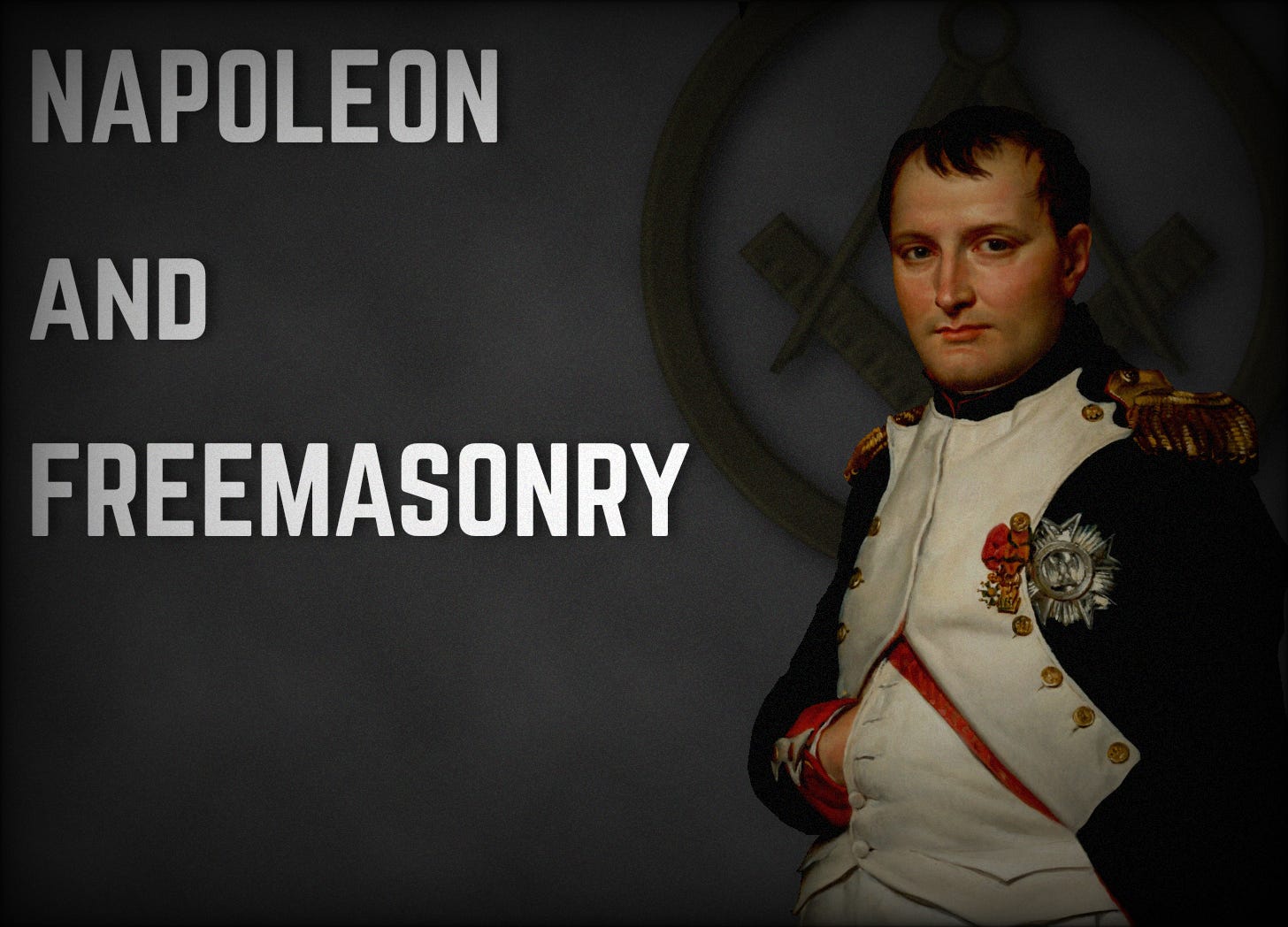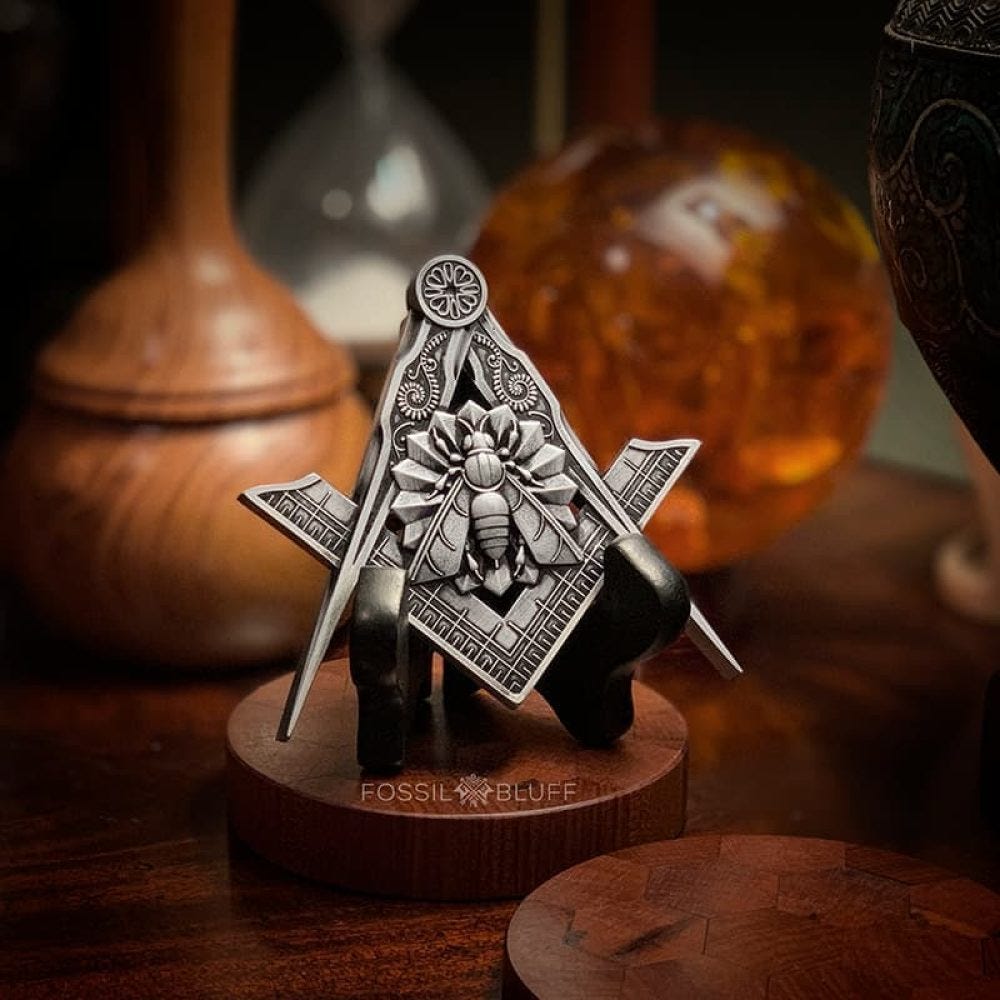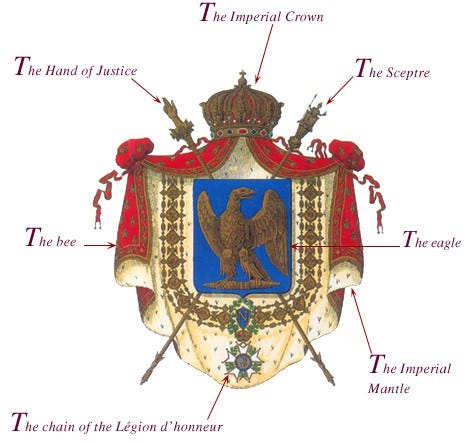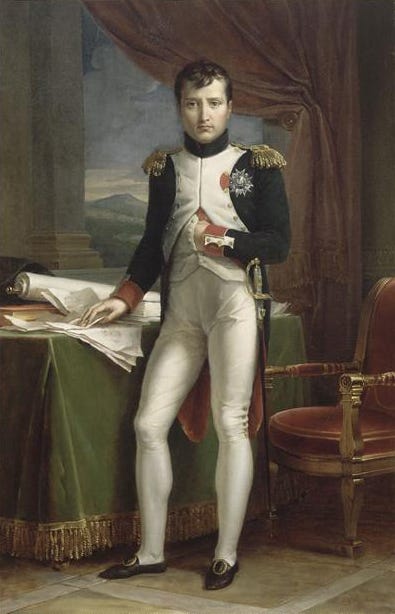Napoleon and Freemasonry
It is often claimed by people on the dissident right that Napoleon was some sort of based proto-Hitler who broke France away from the Judeo-Masonic hold of Jacobinism. This could not be further from the truth.
According to the Oginski masonic lodge’s website “Back in Corsica, Bonaparte grew up surrounded by Freemasons – after all, his father and all three brothers were Freemasons. There is no doubt that the family spoke about Freemasonry all the time.”1 The Grand Lodge of British Columbia’s website gives even more detail on just how intertwined with Masonry Napoleon’s family was, stating that
“Napoleon appointed his brothers to masonic office: [l to r] Louis (1778/08/02 - 1846/07/25) was named Deputy Grand Master in 1805; Jerome (1784/11/15 - 1860/06/24) was Grand Master of the Grand Orient Westphalia; the eldest, Joseph (1768/01/07- 1844/07/28), was made a freemason at the Tuilleries in April of 1805, and appointed Grand Master of the Grand Orient of France; and Lucien (1775/05/21 - 1840/06/29) was a member of the Grand Orient of France.”2
Wikipedia states that the Grand Orient of France, which Napoleon sent two of his brothers to, “is generally regarded as the ‘mother lodge’ of Continental Freemasonry”.3 The prominent Masonic organization Universal Co-Masonry’s website states that “The Rite of Adoption, which allowed women to be “adopted” into Freemasonry, grew as well. Napoleon’s own wife, Josephine, was a member of this Rite, giving further evidence to those who claim Napoleon was himself a Mason.”4 Napoleon’s wife was not just a passive member of a lodge of adoption, according to Masonic author Albert Mackey, who was the Master of Solomon's Lodge No.1, “the Empress Josephine presided at the meeting of one at Strasburg in the year 1805”.5
It is unknown if Napoleon himself was a freemason but there is a case to be made that he was. In freemasonry bee symbolism is sometimes used. This symbolism was adopted from the ancient Egyptians.6
According to most accounts that claim Napoleon was a mason he is said to have been initiated in Egypt. If Napoleon did indeed become a freemason in Egypt then that would explain why he put bee symbolism everywhere. It is not very speculative to connect these dots given that “The Rite of Memphis is a Masonic rite created to restore the Hermetic and esoteric symbols of Egypt. In the year 1815, the Rite of Memphis was created by many ex-soldiers who had partaken in Napoleon’s expedition”. 7
Conspiracy obsessed people often claim that any person making the “hidden hand” gesture in a portrait or photograph must be a freemason. While this is usually poor reasoning, the Egyptian connection rears it’s head here once again, “Freemasonry's homage to the heart through the sign of the hand is explained by some Masonic historians in the fact that the rituals of Freemasonry hark back to ancient Egyptian religions”.8
Napoleon was not just surrounded by freemasonry in his close family, but also in his own government. The Quatuor Coronati Lodge, which is “dedicated to Masonic research”9 stated that 5 out of 6 Members of Napoleon's Grand Council were Masons, as were 22 out of his 30 Marshalls, and 6 out of 9 of his lesser imperial officers.10
Some will respond to this overwhelming evidence with a dismissive statement that Napoleon only surrounded himself with Freemasons so he could keep tabs on them. This explanation fails for many reasons. Firstly, Napoleon’s father and brothers had become Freemasons well before Napoleon had any ambitions of taking power.11
Secondly, according to the rare book History of the Grand Orient of France, Napoleon was approached by freemasons who made the case that associating with their secret society “might be made very useful to him politically”, this encounter led to Napoleon reading a book that made him enamored with masonry and
“determined to protect the Freemasons, he gave them his brother, then King of Spain, for Grand Master, and Cambaceres was named Grand Master Adjunct. He directed his generals, the members of his court, and all public functionaries to enter the lodges.”12
If true, this source thoroughly discounts the notion that Napoleon was motivated by suspicion of freemasons. It probably is true, given the fact that Napoleon took the title “The Protector of Freemasonry”.13
Finally, both freemasons and their Jewish puppeteers benefited greatly from Napoleon’s rule. Universal Co-Masonry’s website states that “Freemasonry enjoyed a golden age in France and all the parts of Europe that came under Napoleon’s rule … the number of Lodges in France grew from 300 to 1,220 and membership soared to match.”14 One of these new lodges, the Bonaparte Lodge, was created to honor Napoleon, bearing his family name.15 According to Wikipedia,
“In countries that Napoleon Bonaparte's ensuing Consulate and French Empire conquered during the Napoleonic Wars, he emancipated the Jews and introduced other ideas of freedom from the French Revolution. For instance, he overrode old laws restricting Jews to reside in ghettos, as well as lifting laws that limited Jews' rights to property, worship, and certain occupations.”16
The implications of Napoleon removing restrictions on Jews entering “certain occupations” should be obvious.
Napoleon also created a court called the Grand Sanhedrin17 in order to give Jews a voice in his government and allowed the Rothschilds to open the Bank of Paris.18
In conclusion, you can respect Napoleon’s military genius for what it was, but don’t pretend that he’s something he’s not.









